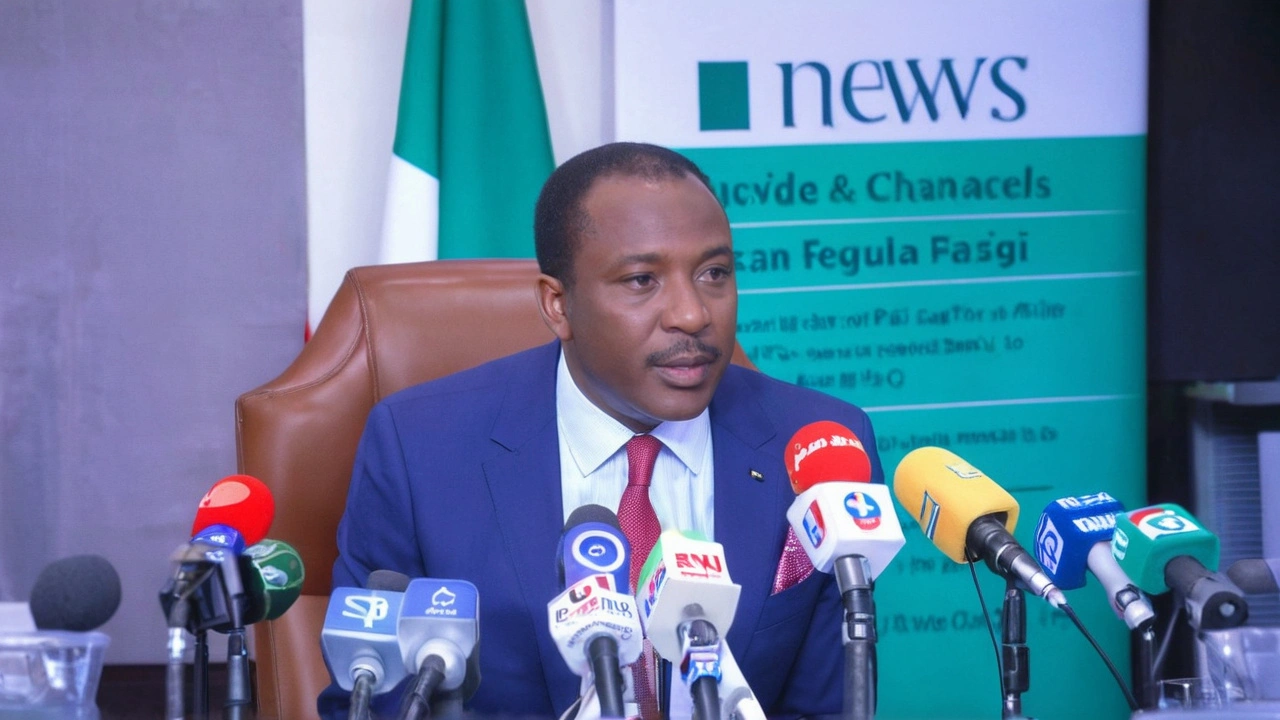CBN Approves Providus Bank's Takeover of Unity Bank with Monumental N700 Billion Loan
The Central Bank of Nigeria (CBN) has endorsed Providus Bank Limited's takeover of Unity Bank Plc, marking a significant event in the landscape of Nigerian banking. This acquisition entails a substantial redistribution of assets, with Providus Bank absorbing 80 percent of Unity Bank's assets, leaving Unity Bank with a 20 percent share. As part of this strategic financial maneuver, the newly formed entity will benefit from a colossal N700 billion loan structured as a 20-year term loan. This financial support aims to fortify the new institution against potential economic instability and bolster its long-term sustainability.
Loan Details and Payment Structure
The loan provided by the CBN comes with an interest rate of the Monetary Policy Rate (MPR) minus 11 percent, which is subject to a floor of six percent. The repayment process is set to occur in a semi-annual schedule, allowing for efficient financial planning and management. The principal repayment obligation will be deferred for the first five years, followed by 15 equal installments spread over the remaining period. This structure ensures that the new entity can focus on growth and consolidation during the initial years of the merger, without the immediate burden of repayment.
Additionally, the loan allocation will address existing financial obligations of Unity Bank, which total N303.7 billion. This includes a staggering N92 billion owed to First Bank of Nigeria for clearing obligations. Furthermore, it covers N51.70 billion in financial accommodations from the CBN itself, N25 billion for the Anchor Borrowers Programme, and N135 billion related to NIRSAL obligations. This strategic payout aims to clear existing debts, providing a cleaner slate for the post-merger organization.
Investment in Federal Government Bonds
After settling Unity Bank's obligations, the remaining N396.30 billion from the financial accommodation will be invested in a 20-year Federal Government of Nigeria (FGN) bond. This investment qualifies as a Tier 2 capital instrument, bolstering the shareholder funds and providing a robust capital base for the new entity. This prudent investment strategy ensures long-term stability and compliance with regulatory requirements, thus, fortifying the bank's financial health.
Waivers and Opening Balances
In a move to ease the transition, the CBN has waived Unity Bank’s Cash Reserve Ratio (CRR) shortfall of N117.90 billion. Providus Bank’s CRR balance post-merger will serve as the opening balance of the new entity, ensuring a seamless integration of financial records and regulatory compliance. These strategic financial maneuvers are designed to alleviate operational burdens and foster a smooth transition to the new operational model.
Commitment to Stability
The merger has been touted as a pivotal move to enhance the stability of Nigeria's financial system. The CBN, through its Acting Director of Corporate Communications, Mrs. Hakama Sidi Ali, emphasized that this arrangement is not merely a financial merger but a crucial step toward safeguarding the financial health and operational stability of the newly formed entity. By facilitating this merger, the CBN aims to avert potential systemic risks and ensure that the banking sector remains resilient and robust.
The joint statement from Providus Bank and Unity Bank echoed this sentiment, expressing their satisfaction with the CBN’s approval. They highlighted that the merger represents a strategic and complementary union, poised to leverage the strengths of both banks. The merger is expected to create a leading financial institution in the industry, capable of driving significant economic growth and providing enhanced services to customers.
Future Prospects and Industry Implications
As this merger unfolds, industry analysts are keenly observing its broader implications for the Nigerian banking sector. The strategic pairing of Providus Bank and Unity Bank could set a precedent for future mergers and acquisitions, offering a blueprint for effective asset redistribution and financial consolidation. The infusion of N700 billion in loan support underscores the significant role that regulatory bodies like the CBN play in shaping the financial landscape.
This merger is more than just a business transaction; it represents a strategic alignment aimed at fortifying the banking system against potential economic shocks. The proactive measures taken by the CBN to facilitate this merger are indicative of a broader commitment to maintaining financial stability. By mitigating potential risks and ensuring smooth operational transitions, the CBN is demonstrating its role as a guardian of the financial sector.
Conclusion
Ultimately, the Providus-Unity Bank merger, backed by a hefty N700 billion loan, heralds a new era in Nigerian banking. This harmonious union is expected to foster greater financial stability, enhanced service delivery, and robust economic growth. As the institutions integrate and begin to function as a single entity, the entire financial system stands to benefit from a more resilient and dynamic banking sector. The CBN’s decisive actions and supportive measures will likely serve as a model for future endeavors, ensuring the sustained health and vibrancy of Nigeria's banking industry.




Let’s cheer on this bold move and hope the new bank thrives!
Reading through the CBN’s backing feels like watching a phoenix rise from the ashes of a troubled banking sector. The loan’s structure, with a five‑year grace period, signals a willingness to let the new entity breathe before demanding repayment. It also mirrors a broader economic rhythm where stability begets growth, and growth fuels more stability. I can’t help but see this as a micro‑cosm of the larger cycles that govern our markets. Ultimately, if the merged bank plays its cards right, it could set a precedent for future consolidations.
It is astonishing how the CBN appears to be orchestrating a grandiose financial theatre, complete with a N700 billion loan that reads like a plot device in a dystopian saga. One cannot ignore the shadow of hidden agendas that linger wherever massive sums are allocated, especially when the terms are veiled in technical jargon. The interest rate, pegged at MPR minus eleven percent but floored at six percent, feels like a calculated compromise designed to appease both regulators and market elites. Moreover, the deferment of principal repayments for the first five years is a clever stratagem that buys the new entity precious time to cement its market position. Yet, beneath this veneer of support, I suspect a covert network of power brokers is quietly reshaping the banking landscape for their own benefit. The fact that Unity Bank’s former debts, including a monstrous N92 billion owed to First Bank, are being absorbed raises questions about who truly gains from this consolidation. Is this merely a rescue mission, or a subtle maneuver to concentrate financial influence under a single, more controllable umbrella? The investment of the leftover N396.30 billion into a 20‑year federal bond, touted as Tier 2 capital, could also be a strategic move to lock the new entity into long‑term governmental dependence. Such dependence may erode the bank’s operational independence over time, making it an instrument of state policy rather than a market‑driven institution. Furthermore, the waiving of the Cash Reserve Ratio shortfall suggests a willingness to overlook prudential standards when political convenience dictates. Critics may argue that this sets a dangerous precedent, encouraging future banks to flout regulations with the expectation of eventual bailouts. In my view, this is a subtle form of regulatory capture, where the lines between supervision and facilitation become dangerously blurred. The narrative of “stability” presented by the CBN could be a smokescreen, masking a deeper restructuring of power dynamics within Nigeria’s financial sector. As we analyze the fine print, I cannot help but notice the conspicuous absence of transparent stakeholder consultation, which is essential for democratic oversight. The decision to merge a relatively smaller bank like Providus with the beleaguered Unity Bank also hints at a strategic alignment of political loyalties. While the public discourse celebrates the potential for “enhanced service delivery,” we must remain vigilant about the underlying motives that drive such monumental financial engineering. In the end, only time will reveal whether this grand experiment solidifies the banking system or simply reshapes it to serve hidden interests.
Wow, that’s a deep dive! 🤔 I appreciate the passion you bring to the discussion, and I think the CBN’s move could indeed be a catalyst for growth if handled responsibly. Let’s hope the new institution balances ambition with prudence, because a solid foundation benefits everyone. 🙏
i cant believe how the media is blowing this up Its just a normal bank merger nothing mystical but everyone acts like its the end of the world also the loan terms look silly but i guess thats how the big banks play
The financial consolidation you describe must be evaluated within the broader context of national economic sovereignty. It is imperative that such strategic partnerships align with the country's development objectives and do not compromise indigenous financial autonomy. By ensuring that the merger serves the interests of Nigerian citizens, we uphold the integrity of our banking sector.
It looks like the merger could bring more stability to both banks and their customers.
Indeed, the amalgamation promises enhanced liquidity, diversified asset portfolios, and, importantly, a fortified capital base; all of which are crucial for maintaining confidence among depositors and investors alike. Moreover, the strategic allocation of the loan proceeds toward government bonds further solidifies Tier 2 capital, thereby strengthening regulatory compliance and risk mitigation frameworks.
While the headline sounds impressive, the real test will be how the merged entity manages the inherited non‑performing loans. If the risk management framework is not robust, the N700 billion support could quickly turn into a liability rather than a lever for growth.